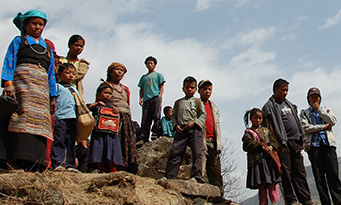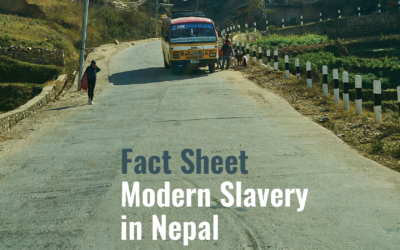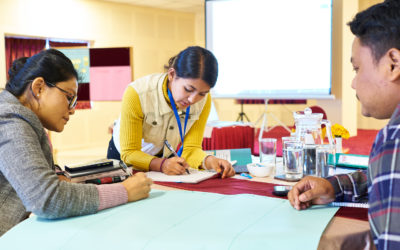Nepal
Slavery in Nepal
Unsafe Migration
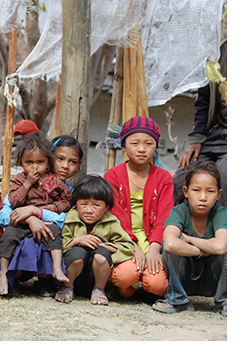 Nepal’s economy depends on people leaving home. Money sent back by Nepali workers in overseas jobs makes up one-quarter of the country’s national income.
Nepal’s economy depends on people leaving home. Money sent back by Nepali workers in overseas jobs makes up one-quarter of the country’s national income.
Many seek construction and domestic servant job opportunities in Persian Gulf countries. Others head to Malaysia and Indonesia, where manual laborers are in demand. Some even head to India to work in circuses.
For many job seekers, the journey leads to dehumanizing abuse. Women are forced into numerous forms of prostitution. Men are brutalized at dangerous work sites.
As migrants in foreign lands who’ve been tricked with false contracts and had their passports taken, Nepalis are especially vulnerable. They suffer horrific violence and violations of their most basic human rights. Escape is virtually impossible.
Exploitation at Home
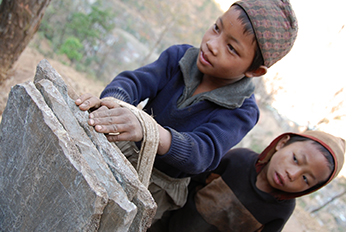 Social, cultural, and economic systems of marginalization in Nepal lead to poverty, neglect, and enslavement of Nepalis at farms and in quarries as forced laborers and in bars, restaurants, and massage parlors as forced prostitution sex slaves.
Social, cultural, and economic systems of marginalization in Nepal lead to poverty, neglect, and enslavement of Nepalis at farms and in quarries as forced laborers and in bars, restaurants, and massage parlors as forced prostitution sex slaves.
Families lacking resources to cope with financial shocks, such as medical emergencies, find themselves enslaved in debt bondage. Children are pressed into service beside their parents, carrying heavy loads of stones that weigh more than they do.
The structures and mechanisms for holding government officials and slave holders accountable under Nepali law are often missing or weak. Vulnerable communities lack an understanding of their rights and how to avoid the risks that lead to slavery.
Communities are often atomized and lack both community-based anti-slavery organizations and non-governmental agencies that serve as protectors and advocates. There has been inadequate investment in building the capacity of local civil society organizations that can work on behalf of enslaved or at-risk communities.
Our Solutions in Nepal
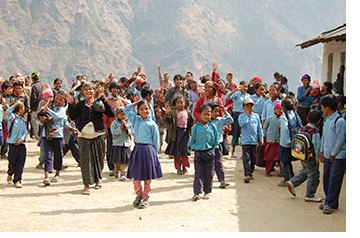 Community-based approaches are needed to sustainably eradicate slavery.
Community-based approaches are needed to sustainably eradicate slavery.
Community organizing provides a vehicle for rights education, where slaves and vulnerable people can recognize the illegality of their situation and make plans to assert their freedom.
An organized community turns slaves and vulnerable people into human rights activists and a population of marginalized people into a movement that can leverage significant and lasting change.
Our Nepal project (2006-2018) had four main approaches.
- Community Empowerment and Safe Migration Education. We worked in rural communities to bring trafficked children home and find ways to end trafficking in villages. Free the Slaves built and reinforced a grassroots movement of community vigilance committees in the most affected communities. These committees made demands of public officials and slave holders, spread awareness of trafficking and slavery risks and human rights, challenged harmful norms within the community, and assisted in rescues, returns and reintegration of slaves. We also supported vocational training and income generating activities for members of the committees. Small loans or seed investments were given to survivors with business ideas such as mobile shop carts, fishing boats, and bicycle taxis. The terms of the loan were more favorable to the survivors than they would get from many other local micro-credit programs and are targeted at formerly enslaved women.
- Empowering Women and Girls in the “Entertainment” Industry. We strengthened and united women and girls in the restaurants and dance bars of Kathmandu so that they could escape and prevent sex slavery. Self-help groups helped women and girls find jobs where they would be safe, properly paid, and treated with respect. These groups pressured business owners to pay fair wages and prevented customers from abusing workers, filed cases with the police, helped women collectively save money in a revolving fund, and gained access to health care, counseling, and educational support.
- Advocate for Tougher Law Enforcement. We helped the Nepalese government improve its laws and actions against slavery. Our advocacy efforts were aimed at improving the country’s National Plan of Action Against Trafficking, ensuring slavery is better defined in the constitution, and promoting ratification of the United Nations Protocol Against Trafficking.
- Enlist International Organizations. We trained field staff for large anti-poverty development projects so that they could identify slavery and trafficking and help prevent community members who were migrating to work from being enslaved.
Read our report about the need for regional collaboration among South Asian anti-slavery organizations. Read our literature review on slavery in Kathmandu’s “entertainment” industry in Nepal.
Read our co-authored research report on anti-trafficking efforts in post-earthquake Nepal.
Our Partners in Nepal
In Nepal, our partners included:
- Women Skill Creation Center: WOSCC is based in one of Nepal’s most trafficking-prone districts and advocates for stronger anti-slavery policies, organizes women against domestic violence, and provides vocational training, access to education, and counseling to girls returning from slavery in India and local children held in domestic slavery.
- Gramin Mahila Srijansil Parivar: GMSP is a village-based women’s anti-trafficking movement that reduce women’s economic vulnerability to trafficking and helps freed slaves challenge the stigmas they face and rebuild their lives.
- Shakti Samuha: It’s the first organization in Nepal established and run by survivors of trafficking. Shakti Samuha organizes women in Jhapa and Bardiya Districts to resist slavery and provides education and support so women can safely migrate overseas for work and avoid traffickers.
- Alliance Against Trafficking in Women and Children in Nepal: AATWIN is a coalition of more than 20 Nepali anti-slavery organizations providing a voice in the national capital for activists working in disparate and remote areas of the country. AATWIN adopts a common agenda that focuses the advocacy of the anti-slavery movement on tangible steps that can be undertaken collectively.
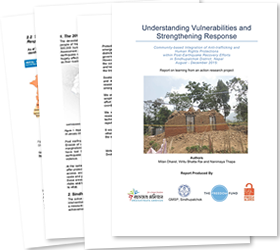
Understanding Vulnerabilities & Strengthening Response
Nepal’s 2015 earthquake killed thousands, left large parts of the country in ruins, and sparked a sharp rise in human trafficking. This action-research project documented the post-earthquake experience in Nepal, and provided essential action-step recommendations to ensure that desperate and vulnerable people aren’t enslaved in the aftermath of natural disasters around the globe. Full Report
The Latest From Nepal
Modern Slavery in Nepal
Free the Slaves, along with the Alliance Against Trafficking of Women and Children in Nepal (AATWIN) and the Shanti Foundation, have worked on putting together a fact sheet on ‘Modern Slavery in Nepal’ for easy and handy availability of information on modern slavery....
Alliance 8.7 and Accountability Framework Webinar Report
Alliance 8.7 and Accountability Framework Webinar Report On 15 June 2023, Free the Slaves and the Alliance 8.7 secretariat in Nepal hosted a webinar to increase awareness of Alliance 8.7, the Pathfinder countries, and the accountability framework. The target audience...
Training Organizations to Mobilize Communities in Nepal
Free the Slaves and Read Nepal organize Community Liberation Training in Kathmandu, Nepal.

